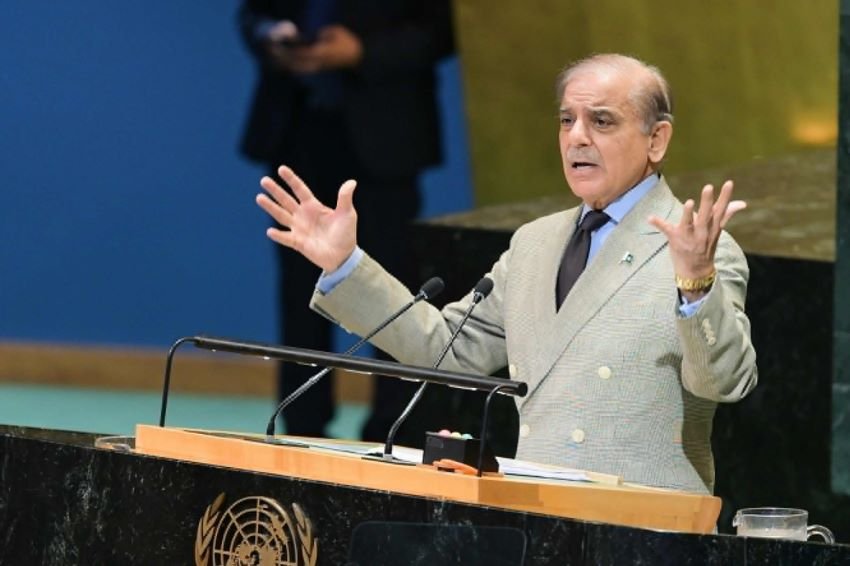New York (TDI): Prime Minister Shehbaz Sharif told the United Nations General Assembly (UNGA) that Pakistan is ready to “win peace” in South Asia after successfully defending itself against Indian aggression earlier this year.
“We have won the war, and now we seek to win peace in our part of the world,” the premier declared in his address to the 80th UNGA session, calling it his “most sincere and serious offer” before the world body.
The two nuclear neighbours clashed in May in their most serious confrontation in decades after India launched strikes inside Pakistan following the Pahalgam attack in IIOJK. New Delhi accused Islamabad of involvement, a charge Pakistan has rejected.
Recalling the four-day conflict, Shehbaz said Pakistani forces acted with “professionalism and bravery” under Field Marshal Asim Munir’s leadership. He said the Pakistan Air Force downed seven Indian fighter jets, forcing the enemy to retreat. “The aggressor came with arrogance; we sent them back in humiliation,” he added.
Though holding the advantage, the prime minister said Pakistan accepted a ceasefire mediated by US President Donald Trump, crediting him with averting a wider war. Islamabad has since nominated Trump for the Nobel Peace Prize for his “outstanding contribution” to peace efforts in South Asia.
Despite the military standoff, Shehbaz reiterated Pakistan’s willingness to engage in a “composite, comprehensive, and result-oriented dialogue” with India on all disputes, including Kashmir.
He warned against unilateral Indian attempts to suspend the Indus Waters Treaty, describing any violation as “an act of war.” The premier reaffirmed Pakistan’s support for the Kashmiri people’s right to self-determination under UN resolutions.
Palestine And Global Conflicts
Turning to the Middle East, Shehbaz condemned Israel’s “unspeakable terror” in Gaza and the West Bank, describing it as one of history’s darkest chapters. He urged an immediate ceasefire and reaffirmed Pakistan’s support for a sovereign Palestinian state with pre-1967 borders and Al-Quds as its capital.
“Palestine can no longer remain shackled. It must be liberated,” he said, recalling Pakistan’s early recognition of Palestine in 1988. He also denounced Israel’s attacks on Doha and its violation of regional sovereignty, while expressing solidarity with Qatar.
On the Ukraine war, Shehbaz called for a peaceful settlement under the UN Charter to end human suffering.
The premier reminded the assembly that Pakistan has been on the frontline of the fight against terrorism for over two decades, losing 90,000 lives and suffering economic losses of $150 billion.
Read More: Shehbaz, Trump Hold First Oval Office Talks on Security and Cooperation
“Terrorism anywhere is terrorism everywhere,” he said, arguing that Pakistan’s struggle prevented extremist groups from spreading globally. He condemned foreign-backed militants operating from Afghan soil, naming the banned TTP, BLA, and other outfits behind recent attacks, including the Jaffar Express hostage crisis.
On Afghanistan, Shehbaz said peace and connectivity in the region depended on stability there. He urged the Kabul authorities to respect human rights, especially women’s rights, and to act decisively against terrorists.
He also warned that ideologies such as India’s “Hindutva-driven extremism” posed a global danger. Shehbaz welcomed the appointment of a UN special envoy to counter Islamophobia, calling it a “pressing necessity.”
The prime minister devoted a major portion of his speech to the climate crisis, recalling the devastating floods of 2022 and 2025 that displaced millions, killed thousands, and caused damage worth tens of billions of dollars.
He said Pakistan contributes less than 1% of global emissions but bears the brunt of climate change. “This is not fairness, this is not equality, this is not justice, this is not fair play,” he said, criticising the expectation that Pakistan should borrow more loans to rebuild.
Read More: Loans No Answer to Climate Crisis, Nations Must Deliver on Pledges: Shehbaz
Shehbaz mentioned a climate emergency in Pakistan and vowed that the nation would rebuild with resilience: “We will not rely on endless loans; we will stand on our own feet with blood and sweat.”
Concluding his speech, Shehbaz said Pakistan would always stand for peace, justice, and inclusive multilateralism.
“Let this 80th anniversary of the UN not just commemorate history but make history, and chart a future of hope for the next 80 years,” he said.



